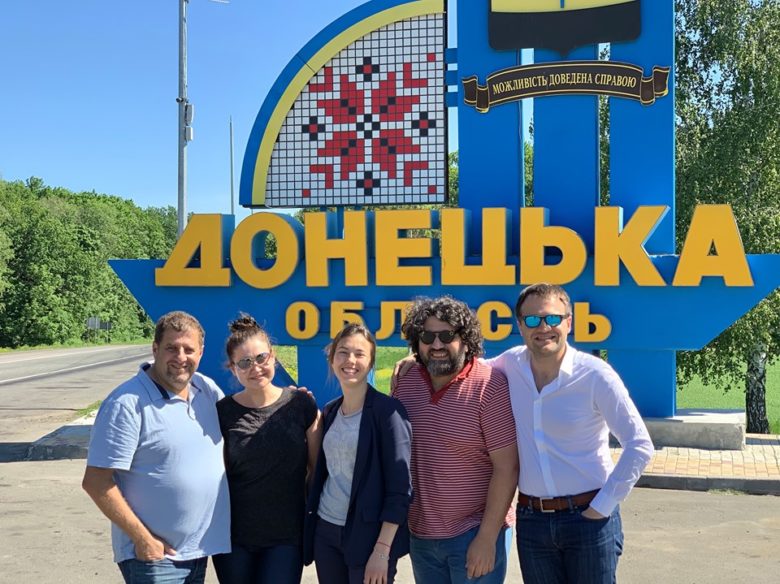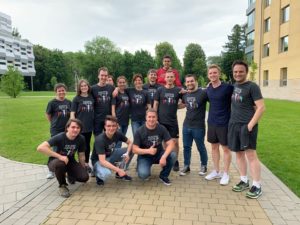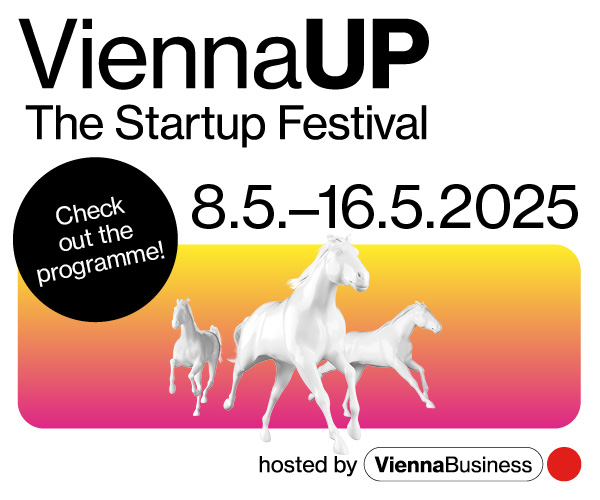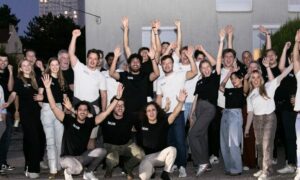Why I Organized A Startup Event In Donetsk And What Else Is Interesting About The Ukrainian Ecosystem

Max Gurvits is a well-known in Bulgaria, and Eastern Europe networker, entrepreneur and investor. He was once part of the first fund of Eleven and later on started organizing different networking events and acceleration trainings throughout the region. This is why he has a quite unique perspective on what is going on in the surrounding markets, and why invited him to tell us more about his recent findings about Ukraine.
In May this year, I held a startup event called TRACTION Camp* in the small town of Kramatorsk, in the conflict zone near Donetsk in Eastern Ukraine. Since Russia invaded Ukraine in 2014, many of the sponsors and partners that I work with, particularly USAID, have been focusing a lot on Eastern Ukraine. With the city of Donetsk itself occupied by pro-Russian rebels, the government of Donetsk region, and many businesses, universities, and other workplaces moved to smaller towns within the Ukraine-controlled part of Donetsk region, like the town of Kramatorsk.
You’ll be surprised, but Kramatorsk is actually just a sweet little Ukrainian town, in many ways much greener, cleaner, and nicer than the big cities of the country. It reminded me of a lot of similar towns in Bulgaria, like Shumen or Gabrovo. They always have factories with housing estates, a pedestrian main street, and the mandatory Soviet-style officers’ club or culture house. There are also many startup founders, local entrepreneurs that run a second-hand-car website or restaurant chains. It’s a bit like Bulgaria in 2011, when we started the first acceleration fund Eleven: many people with established online or offline businesses trying to build a scalable digital product.
Oligarch money and the next Estonia
Ukraine is in many ways ahead of other Eastern European countries. The country has a very solid STEM base, with relatively good fundamental education, and a very large number of engineering jobs, mostly in software development. It is estimated that Kyiv alone has over 600,000 tech jobs in software. Hence, there is a lot of tech talent, and there have been a number of exciting companies coming out of the country. Also, Ukraine is often a destination for tech companies from elsewhere to open an office and hire local talent.
With venture funding still relatively hard to access, I would say Ukraine is today where Bulgaria and Baltics were about ten years ago. I think Baltics is actually an excellent comparison because the proportional volume of talent and opportunity in Ukraine resembles Baltics more than Bulgaria. So the reason we’re all excited, I guess, is that we see another potential Estonia, only much bigger, in 10 or 15 years from now.
Ukraine isn’t part of the EU, and unfortunately, it’s formally the least wealthy country in Europe. Those are the two main reasons why venture capital is scarce in the country. Much like in Bulgaria in decades past, we see locally successful entrepreneurs as the main source of funding, and not EU/government, corporations, and banks. That can be a good thing at the very early stage, as angel funding, but without follow-up from proper VC it serves no purpose.
I’ve also seen some really wild schemes in Ukraine in the past years, were mainstream oligarchs (once it was the uncrowned “dairy king” of Ukraine) would invest heavily in a startup program with fund, usually focused primarily on getting returns from the real estate the program would occupy. I think this is a (sadly, inevitable) step in the development of the ecosystem, that will be put behind once there are more exits and more foreign talent on the ground, both on the investor and the company side.
Once major hubs of the Soviet industry…
I have actually been organizing various startup-ecosystem-building activities all across Eastern Europe, not just Ukraine, for the past eight years. Bulgaria was the first country I started in, and it was because of the head-start we got here, that I was able to take this effort further to places like Ukraine. My first engagement there was in 2013, and I quickly realized that unlike Bulgaria and the other Balkans countries, Ukraine was a different kind of place. It’s much bigger and much more diverse. With 40m+ people, the country is actually huge and it’s really not just one place that matters.
Ukraine has pretty excellent entrepreneurship hubs all across the country. Lviv, being the wealthiest and most European city, is very big in IT solutions, and therefore quite techy and nerdy. Kyiv is the capital, and definitely more trendy and “hipster”. As is Odessa, a capital of culture and leisure, but also with several big tech successes. Cities like Dnipro and Kharkiv are really all engineering and less lifestyle.
Odesa, Dnipro, Kharkiv, and Donetsk were once major hubs of Soviet industry and research. They are now “secondary” cities within Ukraine, itself nominally the poorest country in Europe. And unlike, say, Varna vs. Sofia or Novi Sad vs. Belgrade, people don’t move around between these cities. Distances are bigger, opportunities are fewer. And so my team and I quickly figured out that instead of helping to build a community in the capital city, Kyiv, we need to focus on secondary national hubs.
What really sets people apart in small towns like Kramatorsk, Slavyansk, Mariupol, and other areas of Ukraine that border the occupied parts, is that people are used to hardship. Many of them come from Donetsk, Luhansk, Crimea, and other occupied areas were displaced, and are now in a new place not far from home trying to pick up the pieces and carry on. You don’t have to tell these people anything about leaving their comfort zone. They’re not your typical startup hipsters, chasing the latest fad. They work hard, ask tough questions, and know that their survival depends only on their own skill and effort.
The first big success stories
Probably everyone has heard about Looksery, the AR company that got acquired by Snapchat a few years ago, and that served as the base for the image filters in Snap. Other well-known Ukrainian companies are Readdle, MacPaw, Invisible, Stepshot (indeed a TRACTION Camp alumnus). A few got acquired by big Silicon Valley hotshots, like Stepshot and Looksery. And there are some Silicon Valley success stories like Viewdle, which was acquired by Google, and WhatsApp, which was founded by engineers from Ukraine.

But there’s a lot of work ahead. When we did TRACTION Camps earlier this year, my biggest discovery was the lack of integration between various players and regions in the country. I think Ukraine has an incredible, bright future ahead and it will undoubtedly one day be the leader of tech and entrepreneurship in Europe. But it’s still decades away from this. Now this month we’re going back to Lviv with some of the best experts in startup-community-building, to host a one-day event, Enabler Camp, bringing together all of the community facilitators. And hopefully, we bring this whole Eastern European startup movement a step further.
*TRACTION Camp is one of the programs Max Gurvits developed, originally inspired by the accelerators he worked with e.g. Eleven in Bulgaria. The idea of TRACTION Camp is to take all of the value of an accelerator program, minus the investment, and deploy it within three or four days, instead of three months. He launched the first camps in 2015, in North Macedonia, Ukraine, and Georgia, and since then there had ten batches, with participants from 15 countries. Some of the programs were held in Silicon Valley, bringing people over from Europe to take part on location. TRACTION Camp had over 150 alumni so far, and some of them became pretty successful companies. So with the time Gurvits started considering this as a project that could easily turn into not only a regional network, but a successful investment fund. He’s currently among the partners in Vitosha Venture Partners, that’s applying to manage a €20M government money fund.






























